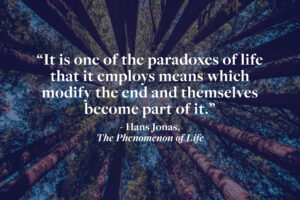Templeton Ideas Challenge
Update (Dec. 3, 2020):
Congratulations to our 2020 Ideas Challenge winners! Over 250 unique ideas were submitted from applicants across the United States this year.
View the winners here!

Ancient philosophers such as Aristotle viewed living things as pursuing various ends or goals. Today, our mainstream biological sciences seldom use such concepts in their explanatory theories, though biologists often use descriptive language that imputes purposiveness to living systems, and some scholars have expressed dissatisfaction with the neglect of goal-directed processes in an otherwise comprehensive theoretical framework. Life itself seems to make use of a variety of strategies that achieve its purposes, and a number of natural phenomena are puzzlingly difficult to describe or account for without the use of purposive language. Is it time to resuscitate purposiveness in biology? In what ways might purpose-related concepts be useful or even necessary for scientific research into artificial intelligence, origin of life, development, macroevolution trends, ecology, and other areas? How might greater attentiveness to purposive categories such as goal-directedness, agency, and directionality catalyze novel theory development and scientific discoveries?
This Ideas Challenge is aimed at exploring novel theoretical, philosophical, or scientific ideas useful for advancing the study of goal-directed, goal-seeking, or goal-suited phenomena in nature. We invite bold thinking that asks how such exploration might open new avenues for inquiry. This is the general area of interest for this Ideas Challenge.
Award
The Ideas Challenge is open to anyone whether inside or outside of academia, who otherwise meets all eligibility requirements as set forth in the Official Rules, found at https://www.templeton.org/ideas-challenge-official-rules. The Challenge is to submit a single-page conceptual description of a novel theoretical, philosophical, or scientific idea that could meaningfully advance the science of goal-directed or goal-seeking phenomena in nature. The Foundation will recognize fifty (50) of the most deserving entries with individual awards of $1000 USD.
The Foundation reserves the right to invite Prize Winners (or other entrants) to future events the Foundation holds and/or to apply for grant funding for the Winner’s or entrant’s ideas in the Foundation’s sole discretion.
Areas of Interest
The John Templeton Foundation is interested in a range of topics and disciplinary fields, and we encourage respondents to explore the categories linked below. Each link opens a unique set of questions that are illustrative of the concepts or phenomena this Ideas Challenge seeks to explore. Along with each set of linked questions there is an application form that provides specific instructions for submission. We encourage respondents to submit as many ideas as are of interest. All submissions are weighted equally for award consideration.
| Agency | Commonalities | Development |
| . | . | . |
| Life | Macroevolution | Matter |
| . | . | . |
| Mechanisms | Models | Organization |
Can’t find a research topic that fits your interests? Simply submit your idea that is within the general area of interest for this Ideas Challenge at https://www.templeton.org/ideas-challenge-general-form.
Award Criteria
Submissions will be reviewed by judges comprised of scientists and philosophers. Evaluation of submissions will happen in two stages. In the first stage, submissions will be assessed according to the criteria of their novelty, impact, clarity of approach, and relevance to the competition as defined further in the Official Rules. Submissions that advance to the second stage will be judged according to one additional criterion—capacity—as defined in the Official Rules. Winners will be notified beginning on September 30, 2020 through the email address provided in the entry. For more information on eligibility, scoring, and other terms and conditions, please see https://www.templeton.org/ideas-challenge-official-rules.
For questions, please contact the Ideas Challenge team at ideaschallenge@templeton.org.